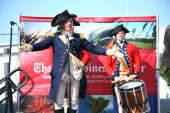As Veterans Day approaches, the venerated Virginian veteran himself, Gen. George Washington, discusses his military past and how he believes veterans should be honored today.
Podcast (audio): Download (3.4MB)
Subscribe: RSS
Transcript
Rachel West: As we strive to honor those who serve each and every day, and with Veterans Day this Friday, who better to speak with than—to quote a line from “Hamilton”—the “venerated Virginian veteran” himself: General George Washington. Thank you for joining me!
Gen. George Washington: Good afternoon, ma’am.
Rachel: Tell me a little bit about your military background.
Gen. Washington: Originally, I begun as adjutant general, first to the southern district in Virginia and then the Fairfax district, which led me to my experiences in the late war, when France were our enemy and not our friend. I was engaged in a number of actions, served as colonel of all of Virginia’s forces in command of two regiments—provincial regulars and a battalion of rangers—but at the time I found nothing but displeasure as a soldier and I resigned my commission for the final time in ‘58 and become a farmer. And then of course, circumstances betwixt us and our former parents grew difficult in the ‘70s and in June of ’75 I was nominated and chosen, commissioned, as general and commander-in-chief of the Continental Army and served in that capacity for eight years.
Rachel: What made you want to take up the cause for America’s freedom and lead the Continental Army?
Gen. Washington: Well it wasn’t my choice, ma’am. I had been nominated for the position. Upon my astonishment at being nominated, I left the room so that my merits or faults might be argued freely without concern of personal offense to me. Then when they’d reached the decision, I stepped back into the room and I said plainly then—and I still feel this way now—that other men could have been chosen. They certainly could have found a better man for the position than myself: I suffered deficiency of education. A great deal of faith was placed upon my shoulders and I attempted to discharge that trust as best I could.
Rachel: How did you work to rally your troops during the war?
Gen. Washington: I was not as successful in those matters as I would have preferred, my different means. We endeavored to see them supplied as best we could, which was more oft than not very difficult. We attempted to see them honored for what was owed them by an award of merit. I endeavored to raise the spirit of men by certain games and entertainments and plays and matters such as that, and truth is, some of the battles we were engaged in were for the purpose of raising the men’s spirits. I think immediately of the first Battle of Trenton. The whole purpose of that was to raise the spirit of the men that they might re-enlist, their enlistments expiring in a week’s time. We did suffer, however, throughout the war off and on with our successes in the field. The spirit of the men always, just as the spirit of our Nation, continued to rise or fall with our successes in the field. But we suffered from a number of disappointments and desertions, and in fact, two outright mutinies.
Rachel: After securing our victory following the Revolutionary War, you became president. What was life like after stepping down from the presidency and retiring to Mount Vernon?
Gen. Washington: [Laughs] Relaxing, ma’am. I hadn’t wished to serve any more as president as I wished to serve as general and commander-in-chief. And it were as if a great weight were lifted off me. I had looked forward to returning to the shade of my own vine and my own fig tree—I was glad to have been allowed to.
Rachel: Did you have a favorite crop that you would grow when you returned to farming?
Gen. Washington: My primary cash crop has been—for several years now—wheat, ma’am.
Rachel: What advice do you have for anyone wishing to join the military now?
Gen. Washington: Oh, you must be patient, you must be brave, and I think it should be a requirement, truth be told. I believe that any citizen of a free nation who relies upon that free nation for his defense, he owes not only a portion of his property to that nation, but also his service.
Rachel: How would you like to see veterans honored today?
Gen. Washington: Several years ago before the beginning of the presidency, my dear friend Nathanael Greene passed, and I endeavored to see the courts place his young son under my care: George Washington Greene. And I did so because of the embarrassment General Greene found his estate within. It is unfortunate, and perhaps a curse of any free nation, that it should always be defended by the minority of its population. But when the majority refuses to honor the debts it owes its veterans, refuses to pay those bounties promised, or their past salaries…the fact that the General Greene could find himself in such circumstances, I think it unforgiveable. We must always endeavor to support those who have risked all for the defense of the many.
Rachel: Thank you so much for taking time out to talk with me, General, it’s been a pleasure.
Gen. Washington: Thank you, ma’am.
Rachel: From Nov. 11 to Nov. 15, military families can receive free Colonial Williamsburg admission tickets during our Honoring Service to America weekend. We also have other special offers for service members and their families other times of the year. More information can be found online at colonialwilliamsburg.com/military.


